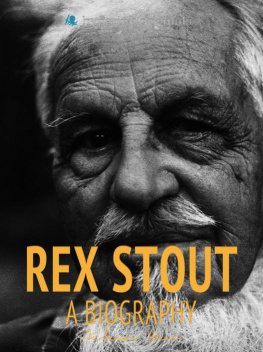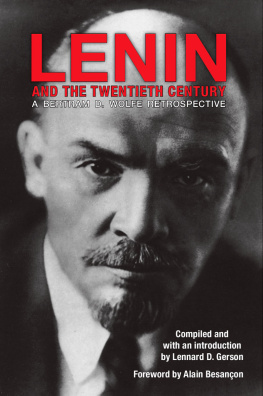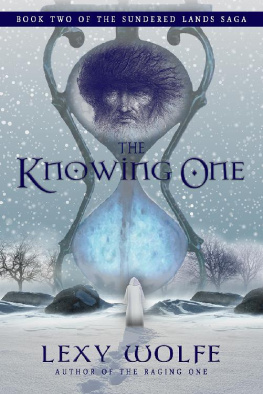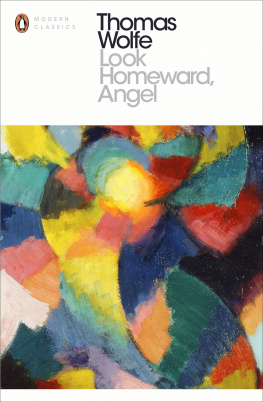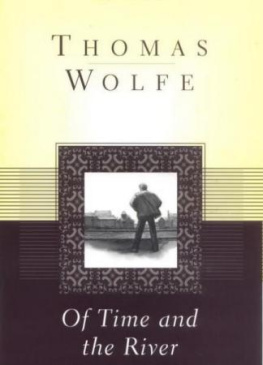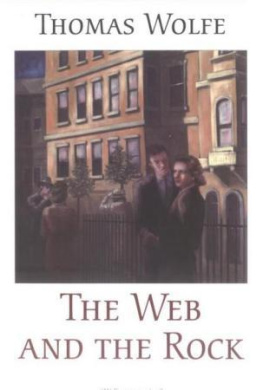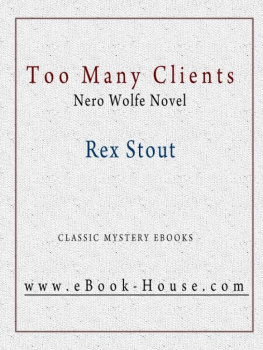Look Abroad, Angel

SERIES EDITOR
Rich Richardson, Cornell University
FOUNDING EDITOR
Jon Smith, Simon Fraser University
ADVISORY BOARD
Houston A. Baker Jr., Vanderbilt University
Leigh Anne Duck, The University of Mississippi
Jennifer Greeson, The University of Virginia
Trudier Harris, The University of Alabama
John T. Matthews, Boston University
Tara McPherson, The University of Southern California
Claudia Milian, Duke University
Look Abroad, Angel
THOMAS WOLFE AND THE GEOGRAPHIES OF LONGING
Jedidiah Evans

2020 by the University of Georgia Press
Athens, Georgia 30602
www.ugapress.org
All rights reserved
Set in 9.75/13 Warnock Pro by Kaelin Chappell Broaddus
Most University of Georgia Press titles are available from popular e-book vendors.
Printed digitally
Library of Congress Cataloging-in-Publication Data in process
ISBN: 9780820356465 (hardcover : alk. paper)
ISBN: 9780820356457 (ebook)
For Renee
CONTENTS
ACKNOWLEDGMENTS
I would first like to thank my dear friend Lucas Thompson for his tireless support in reading drafts, corralling my scattered thoughts, and for helping guide this book toward completion. Lucas is what Stanley Cavell calls a perfectionist friend, and he inspires me to be a better scholar and a better person. I am sure this book wouldnt exist without him.
I would like to thank the entire team at the University of Georgia Press, but particularly my acquisitions editor, Walter Biggins, for his generous and ongoing support of my project, and Thomas Roche, Beth Snead, and Jordan Stepp, for their help in the final stages. Thanks also to Daniel Simon for his careful editing of the final manuscript. I am especially grateful to Jon Smith and Rich Richardson for the inclusion of Look Abroad, Angel in their excellent series, the New Southern Studies, and am particularly indebted to Jon, who was kind enough to take my work seriously when I was ready to give up.
My doctoral supervisor, Paul Giles, saw this book in its earliest stages and provided invaluable support throughout my PhD candidature and beyond. The University of Sydney generously provided a series of grants and research support schemes that enabled me to visit the Thomas Wolfe archives at the Houghton Library and the Wilson Library. I am grateful to staff at both libraries for their support. Thanks also to the Princeton University Library, to the New York Public Library, and to the Deutsche Nationalbibliothek. Access to Wolfes archives, along with permission to publish material from the William B. Wisdom collection, was made possible by Eugene Winick, administrator of the Thomas Wolfe Estate. A quotation from Wolfes unpublished A Letter on Homelessness 2019 by Eugene Winick, Administrator C.T.A. of the Estate of Thomas Wolfe, is reprinted with permission of McIntosh & Otis, Inc. Sections of Bradburys poem October are reprinted by permission of Don Congdon Associates, Inc. 1985 by Ray Bradbury. Three quotations from the Jack Kerouac Papers by Jack Kerouac, 1940 and 1942 by Jack Kerouac, are used by permission of the Wylie Agency, LLC.
Parts of originally appeared in different form as Thomas Wolfe and the Really Deep South, in The Thomas Wolfe Review 38, nos. 12 (2014): 724. I am grateful to both publishers for permission to reuse this material in book form.
I have benefitted enormously from the advice, editorial revisions, and encouragement of numerous friends and colleagues. I am particularly indebted to Jon Eller, director at the Center for Ray Bradbury Studies, for his generous provision of manuscript material and his continuing support of this project. The members of the Thomas Wolfe Society have demonstrated extraordinary generosity since the beginning of my project, and Im especially grateful for the William B. Wisdom Grant in Aid of Research, which enabled me to spend time in Wolfes archives. Other significant help came from Robert Brown, Daniel Cobb, Vincent C. Frank-Steiner, Sarah Gleeson-White, Tim Marr, Vera Meyer, Scott Romine, Catherine Thompson, and Wilfried Weinke.
My family has provided a foundation of encouragement and support since well before I embarked on this project. Thanks to my parents, Ray and Cindy, and to my siblings, Jess and Tim. This book is dedicated to my wife, Renee, whose generous love, support, and deep encouragement is inexhaustible. Renee, I have encountered my fair share of exorbitant and effusive language studying the unrestrained novels of Wolfe, but there are not words enough to express my joy in knowing and loving you.
Look Abroad, Angel
INTRODUCTION
On October 18, 1929, Charles Scribners Sons released the first novel of an unknown North Carolinian author named Thomas Wolfe. What the publisher could not have predicted was that just six days later, on the first of two black days, the New York Stock Exchange would experience its most disastrous decline, followed shortly by a total collapse, in what became the most severe and prolonged economic depression of the twentieth century.
Overwhelmingly, Wolfe critics and enthusiasts have resignedly accepted such pronouncements. When the journal Appalachian Heritage ran a special issue on Wolfe in the fall of 2007, eminent Wolfe scholar John Idol Jr. acknowledged that Wolfes national and international reputation does not position him in the forefront of American or world writers, adding that his standing as a regional author is more assured, particularly when scholars focus on the development of southern Appalachian literature. If these two characterizations of Wolfes significance can be understood as bracketing the authors cultural relevancefrom world writer to regional curiomy book is concerned with situating Wolfe within the global tradition of literature to which Barr points, while extricating his work from the safe confines of Idols regionalism.
This book traces the trajectory of Wolfes critical decline, and I will argue that regional essentialism wasand remainsa contributing factor in the authors waning popularity. Questions of regionalism within the study of the American South have been divisive in the last few decades: as recently as 2013, Leigh Anne Duck identified a persistent disagreement between two approaches to literature that is both from, and about, the southeastern United States, suggesting that [s]ome, however, may still wish to argue for a thickly meaningful and binding regional culture, which I take to be a fairly stark dividing line between new southern studies and other scholars. Increasingly, Wolfes fiction has been tethered to a critical tradition that promotes his significance within a narrow, regional framework, while Wolfes relevance to the broader development of American literature, as well as his global importance, has been largely overlooked.
Even those studies on Wolfe that explore his importance beyond his Appalachian heritage have been strikingly immune to the spatial turn in the study of American literature, which in Paul Giless view should be seen as no longer bound to the inner workings of any particular country or imagined organic community but instead as interwoven systematically with traversals between national territory and intercontinental space.
This book hopes to avoid the pitfalls of previous critical work on Wolfe by closely examining how Wolfes work was received and understood by early readers. My attention to the reception and employment of Wolfes fiction is Investigating how Wolfes fiction has been usedpopularly, critically, politically, imaginativelyopens up new terrain for attending to the meaning of the writer and his work, and moves away from the kind of literary analysis that relies solely on an attentiveness to aesthetic ingenuity or on readings that subordinate the text to the ideological prerogatives of the critic. Moreover, an attention to use can helpfully illuminate the very real ways in which worn-out conceptions of southern or American character
Next page

